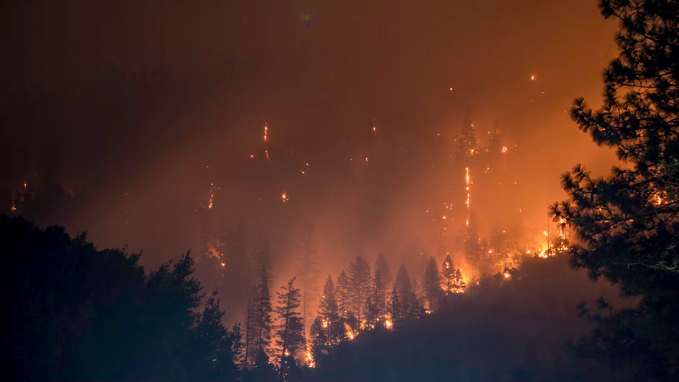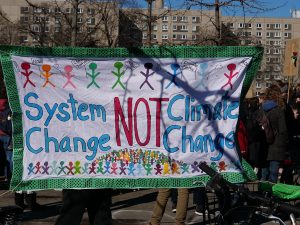I.1. Context: CSR, Sustainability and why it matters
Franzisca Weder and Marte Eriksen
The lady…
In today’s “risk society” (Beck, 2004), the climate crisis is not only about global climate changes and ecological decline but also about the political and communicative capacity of the society to respond (Hackett, 2018). We are in times of a multiple crisis, next to global warming, we are still in a pandemic situation, and political and economic erosion creates a global feeling of insecurity.
We are living in a rapidly changing world, despite some improvement in poverty levels, inequality is rising, conflicts and disaster to humanity is happening around the globe and changes in information and communication technologies (digitalization) accelerate the digital divide, there are still winners and losers of the globalization of communication.
In this multiple-crisis scenario, we experience often rather narrow solutions or individual approaches instead of a system change or cultivation of new principles of action, therefore we are often ineffective to address complex issues in a sustainable way – not only as individuals but also organizations and corporations are often helpless to tackle the diversity of the burning issues today.

Photo by Matt Howard on Unsplash
The crisis narrative is also increasingly visible in public conversations – not only in traditional media formats, but also in social media and direct interactions, one example: The Guardian article. And overview of what is actually happening is available in the most recent IPCC report, or the new “Climate Book” edited by Greta Thunberg.
In the contrary, not so visible, well elaborated and dominant, at least not in public discourses, is the transformation narrative, a narrative that would help us with understanding and performing sustainable development, that would explain socio-ecological transformation processes and make them more tangible. In this first chapter, we will try to entangle the crisis narratives and understand the context of sustainability, social responsibility and transformation.
In the context of a crisis, sustainability is directly related to social change. Social change is defined by sociologists as the ‘transformation of a culture over time’, which can be either deliberate and intended or unplanned, unintentional. Social change and therefore alterations in the very foundational, basic structures can happen on a societal level as well as on a smaller scale, within communities, organizations or institutions.
Its is the rules and resources used and reproduced in social behavior, the value systems and all social relations that change, especially in times of a crisis. Also, some changes are more controversial that others. There are some established sociological theories and perspectives on social change, from rather functionalist theories (Durkheim, 1967, Parson, 1951), to conflict theories (Marx & Engels, 1848) to evolutionary theory (Spencer, 1898). Today, there are various disciplines that explore transformation processes in social values, norms and behavior patterns, from the civil rights movement to the LGBTQ+ movement or the ‘green movements’, like Friday for Future . There is also a tradition around social development that explores the role of communication in participatory, empowerment strategies mainly in local and rural change situations (check the experts).
Sustainable development is one of the big social transformation processes that we will further explore in this book, following the idea of structural and ‘system change not climate change’, further described by UNESCO.

Photo: “FridaysForFuture protest Berlin” by Leonhard Lenz is licensed by CCO Public domain
Sustainable development is the “development that meets the needs of the present without compromising the ability of future generations to meet their own needs” (WCED, 1987: 43). Sustainability is here not only the goal, the main (regulatory) idea where all activities and processes should be focused on, it is by the same time the principle for action, that guides action. Therefore, sustainable development as societal transformation process is an ethically motivated normative concept that refers to a form of economics, corporate and individual behavior and way of life that does not endanger our future (based on the principle of “strong sustainability“); this requires a transdisciplinary response to captures social change also as cultural change.
In this book, we mainly focus on organizations and how (much) they take responsibility in social transformation processes, and the responsibility which is mostly allocated to big corporations and political institutions by the society, and which is often allocated via communication in public conversations (in the media, predominantly social media). To do that, we need to learn more about the terminology, the differences and concepts behind CSR, corporate governance, sustainability, sustainable development, ESG and more, which we will further explore in the next chapter.
The lady…
While I walked along the street, massively irritated by the howling sound of a motorbike that woke me up from my thoughts, I looked at the lady. And I decided to ask her one of my burning questions: What is sustainability? A language token, used and abused in advertisement? A philosophical thought? Or a value?
Further readings …
Thomas, P. N., & Van de Fliert, E. (2014). Interrogating the theory and practice of communication for social change: The basis for a renewal. Springer.
Aguilera, R. V., Rupp, D. E., Williams, C. A., & Ganapathi, J. (2007). Putting the S back in corporate social responsibility: A multilevel theory of social change in organizations. Academy of management review, 32(3), 836-863.
Powell, W. W. (2019). The transformation of organizational forms: How useful is organization theory in accounting for social change?. In Beyond the marketplace (pp. 301-329). Routledge.

